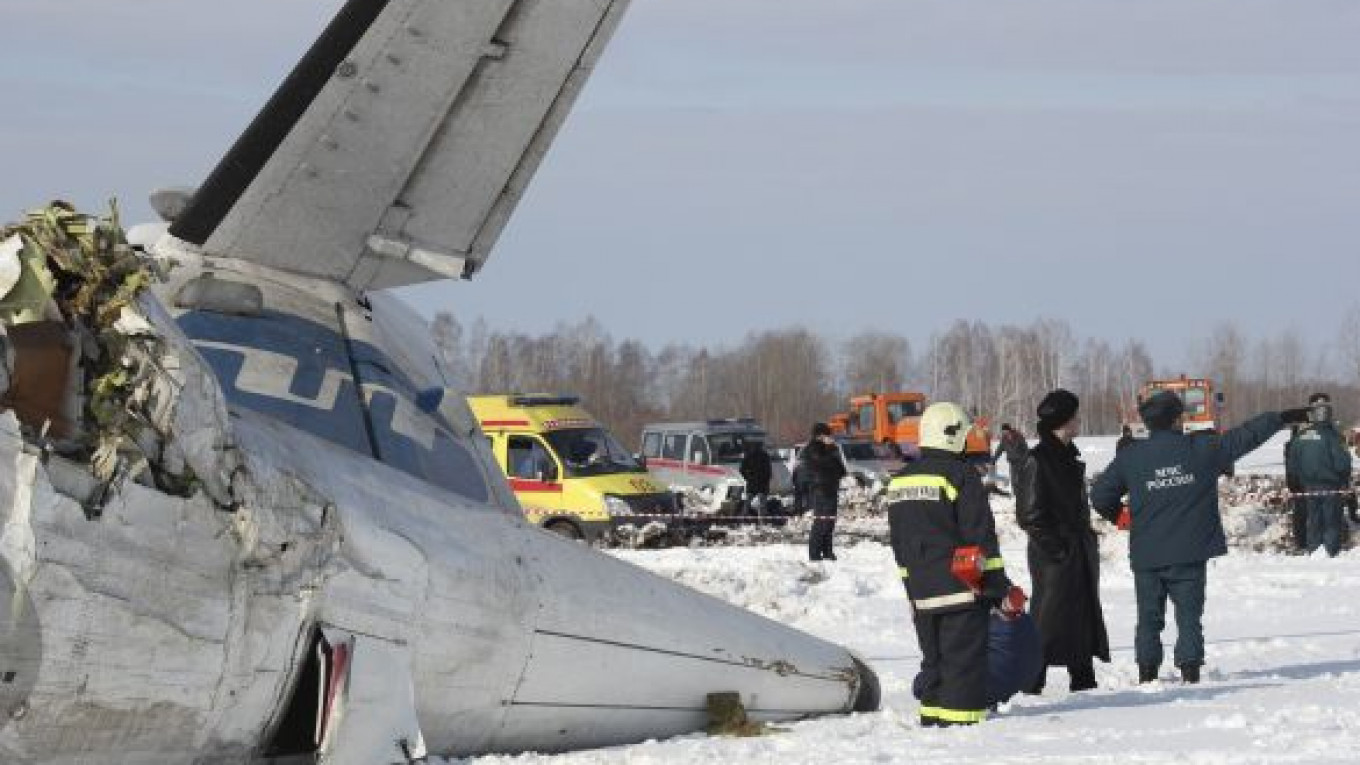A French-made plane operated by UTair crashed minutes after takeoff in Siberia on Monday morning, killing 31 people aboard but miraculously leaving 12 survivors, officials said.
The turbo-prop ATR-72 took off from Tyumen’s Roshchino Airport around 5:33 a.m. Moscow time, headed for Surgut, but was forced into “an emergency landing 1.5 kilometers from the airport,” the airline said in a statement.
The plane broke into three pieces as it slammed into a snowy field and burst into flames. On board were 39 passengers and four crew members, all Russian citizens. The 12 survivors were rushed by helicopter to nearby hospitals with serious injuries.
“One survivor stood up on his own and waited until he was given medical help and only then felt worse,” police chief Sergei Kiselyov told RIA-Novosti.
Another passenger, Lyudmila Volkova, 57, was in deep shock and couldn’t remember immediately her name when asked by rescue workers, the local branch of the Emergency Situations Ministry .
One would-be passenger, Dmitry Grigoryev, narrowly missed the flight, telling Channel One that he decided against continuing on his journey as he was too exhausted from a prior trip.
Photos posted by officials from the crash scene near the village of Gorkovka — some five kilometers from Tyumen — featured half-burned debris lying on an empty snow-covered field surrounded by trees.
The plane’s two flight recorders were recovered and taken for further investigation. While the cause of the crash was not immediately clear, investigators they were looking at technical malfunction or human error as possible culprits. Both pilots were killed in the crash.
A possible cause may have been inadequate use of deicing agents, officials said. “The treatment of the plane with de-icing agents was not done at the necessary level,” Rosaviatsia head Alexander Neradko told RIA-Novosti.
President Dmitry Medvedev changed his schedule Monday, postponing a scheduled meeting with leaders of unregistered opposition parties to discuss political reform, and instead met with Health and Social Development Ministry head Tatyana Golikova.
He ordered her to spare no effort in treating the injured and consoling relatives of the victims.
Officials said the plane was carrying several officials from Surgutneftegaz, Russia’s major oil and gas producer, including company board member Nikolai Medvedev. He did not survive.
The jet was insured by Surgutneftegaz’s insurance company, which is now obliged to pay 2 million rubles ($68,000) to the relatives of each passenger killed.
The pilots involved were both in their 20s. Captain Sergei Antsin would have turned 28 on Tuesday, and the second pilot, Nikita Chekhlov, was 24.
Neither was able to report an emergency before the crash.
Russia ranked as the most dangerous country in the world in which to fly in 2011, with nine crashes claiming 140 lives. That topped even the Democratic Republic of Congo for aircraft-related fatalities.
The catastrophe Monday was the first involving a twin-engine ATR-72 in Russia. Most recent aviation incidents involved older Soviet-made jets. The crash was also the most deadly crash since September’s Yak-42 tragedy in Yaroslavl, which wiped out the entire Lokomotiv hockey team.
The ATR-72 aircraft had been in service since 1992. It first belonged to Taiwan’s Transasia Airways, until 1999, when it was bought by Finnair. From 2003 until 2008, the aircraft was part of Estonia’s Aero Airlines fleet, before finally ending up with UTair.
The French-made plane had 74 passenger seats and engines made in Canada. It was registered in Bermuda, according to the International Aviation Committee.
More than 400 ATR-72s have been produced in the past two decades. UTair is the only Russian airline using the model and listed 14 such aircraft in its fleet before the crash.
Since it began production in 1988, 14 ATR-72s have crashed around the globe. The worst incident involved American Eagle Flight 4184 in 1994 at Chicago’s O’Hare Airport, when the plane went into an uncontrolled roll while in a holding pattern due to ice on its wings. All 68 people on board were killed.
The accident prompted American Airlines, which owns American Eagle, to stop using ATRs in its northern hubs and instead moved them to its southern and Caribbean hubs where ice formation is not common, according to the Aviation Safety Network website.
The last accident involving an ATR-72 was in 2010 when an Aero Caribbean aircraft went down in Cuba, killing all 68 people on board. The crash was also blamed on ice forming on the plane’s wings.
Experts say ice cannot be ruled out in the Tyumen accident.
“If there was ice formation, the Investigative Committee will discover that,” Oleg Smirnov, a former deputy minister for civil aviation in the Soviet Union, told The Moscow Times. “Only the flight recorders will reveal what happened there.”
He said it appeared that the plane’s speed was low at the time of the crash.
Smirnov said the country’s entire air transportation industry has been suffering from negligence by state officials, which could lead to more accidents.
Tyumen regional authorities announced a three-day period of mourning from Wednesday through Friday.
A Message from The Moscow Times:
Dear readers,
We are facing unprecedented challenges. Russia's Prosecutor General's Office has designated The Moscow Times as an "undesirable" organization, criminalizing our work and putting our staff at risk of prosecution. This follows our earlier unjust labeling as a "foreign agent."
These actions are direct attempts to silence independent journalism in Russia. The authorities claim our work "discredits the decisions of the Russian leadership." We see things differently: we strive to provide accurate, unbiased reporting on Russia.
We, the journalists of The Moscow Times, refuse to be silenced. But to continue our work, we need your help.
Your support, no matter how small, makes a world of difference. If you can, please support us monthly starting from just $2. It's quick to set up, and every contribution makes a significant impact.
By supporting The Moscow Times, you're defending open, independent journalism in the face of repression. Thank you for standing with us.
Remind me later.






